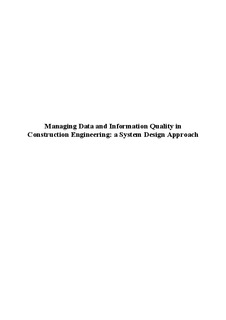| dc.contributor.author | Westin, Soffi | |
| dc.date.accessioned | 2014-05-13T12:06:39Z | |
| dc.date.available | 2014-05-13T12:06:39Z | |
| dc.date.issued | 2014 | |
| dc.identifier.isbn | 978-82-7117-758-4 | |
| dc.identifier.issn | 1504-9272 | |
| dc.identifier.uri | http://hdl.handle.net/11250/194950 | |
| dc.description | Doctoral dissertation, Faculty of Economics and Social Sciences, University of Agder 2014 | nb_NO |
| dc.description.abstract | Following the ADR method made it possible not only to develop a tool, but also to
formulate design principles and abstract the findings to a generalizable level.
This study contributes to knowledge and practice in several ways. First, I offer five design
principles for DQ/IQ assessment tools. These design principles are specifically aimed at
mitigating the unavoidable challenges and their consequences in construction engineering
projects. By accepting these unavoidable challenges and consequences and subsequently
providing means for managing the results in a controlled manner, these principles makes
it possible to avoid project delays and still reach a sufficient level of DQ/IQ in the end.
Second, the development and implementation of a tool in which these design principles
are embedded demonstrates the effectiveness of the design principles. A formal
evaluation performed by comparing a project that used the tool with two projects that did
not, showed a significantly better level of DQ/IQ in the project using the tool.
Third, as a result of implementing the tool in a total of 12 construction engineering
projects, it was possible to determine three needed and sufficient quality dimensions for
rule-based assessment. This finding offers valuable information to theory as well as to
practitioners aiming at assessing DQ/IQ in their projects.
Fourth, by revealing the relationship between unavoidable challenges and their
consequences in construction engineering, this thesis offers unique insights into the nature
of projects in that field, which is highly needed when performing DQ/IQ assessment.
These insights will help DQ/IQ researchers enhance their understanding of a very
complex and under-researched context.
Fifth, by providing a ranked list of DQ/IQ problems experienced at EUMEC, this thesis
offers a more detailed explanation of DQ/IQ problems causing delays and cost overruns
than is the case in previous research.
All in all, this research reduces a gap in the existing literature, namely the scarce amount
of DQ/IQ research on construction engineering. The complexity of this industry makes it
difficult and time consuming for an information systems researcher to fully understand
the nature of construction engineering. This complexity might explain the scarce amount
of research in this cross-disciplinary field, and this thesis helps reduce that gap. | nb_NO |
| dc.language.iso | eng | nb_NO |
| dc.publisher | Universitet i Agder / University of Agder | nb_NO |
| dc.relation.ispartofseries | Doctoral dissertations at the University of Agder; no. 79 | |
| dc.subject | VDP::Samfunnsvitenskap: 200::Biblioteks- og informasjonsvitenskap: 320::Informasjons- og kommunikasjonssystemer: 321 | nb_NO |
| dc.title | Managing data and information quality in construction engineering : a system design approach | nb_NO |
| dc.type | Doctoral thesis | nb_NO |
| dc.subject.nsi | VDP::Social science: 200::Economics: 210::Business: 213 | |
| dc.subject.nsi | VDP::Technology: 500::Information and communication technology: 550 | |
| dc.source.pagenumber | 215 | nb_NO |
